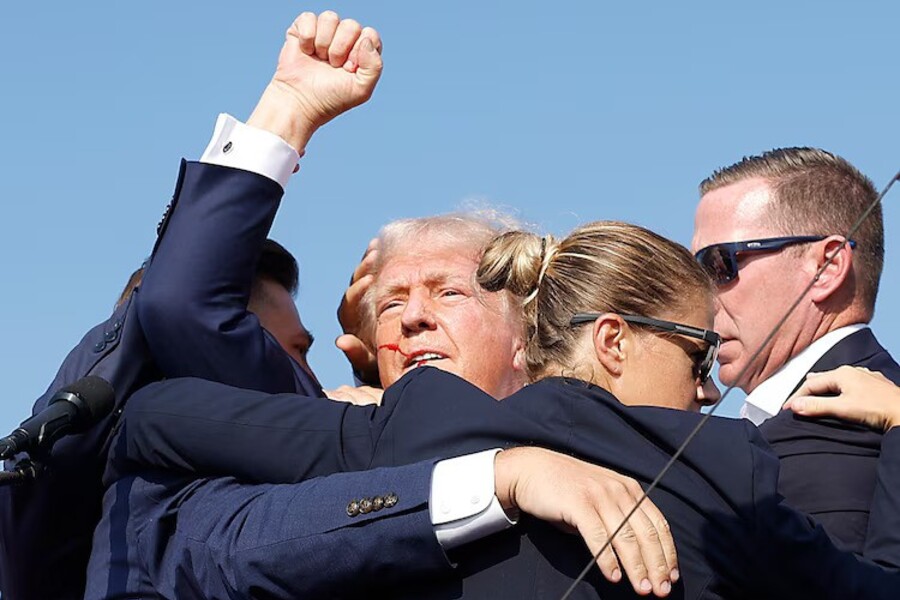President Donald Trump struck a combative tone on multiple fronts this week, denouncing Russian President Vladimir Putin, vowing renewed U.S. military support for Ukraine, and meeting repeatedly with Israeli Prime Minister Benjamin Netanyahu to push for a resolution to the Gaza conflict — all amid swirling questions over federal governance, global trade tariffs, and political tensions at home.
In a sweeping series of Cabinet meetings and bilateral talks at the White House, Trump addressed some of the most pressing global and domestic issues, positioning the U.S. as a muscular player on the international stage while intensifying his administration’s hardline stance on crime, foreign policy, and trade.
Trump Slams Putin, Backs Arms Aid to Ukraine
In one of the most striking moments of the week, Trump publicly rebuked Russian President Vladimir Putin for escalating attacks on Ukraine, signaling a sharp pivot from previous ambiguous rhetoric toward Moscow.
“He’s very nice all the time, but it turns out to be meaningless,” Trump said during Tuesday’s Cabinet meeting, adding, “Putin is not treating human beings right. He’s killing too many people.”
In response to mounting criticism and a reported freeze last week on U.S. munitions deliveries, Trump confirmed that he had authorized the resumption of defensive weapons shipments to Ukraine, reinforcing American support as the war drags on into another year.
We wanted to put defensive weapons [into Ukraine]… and I have approved that,” Trump stated.
While the Pentagon recently paused some deliveries for review, Trump suggested he was unaware of who issued the order, replying, “I don’t know. Why don’t you tell me?” when pressed by a reporter.
🇮🇱 Multiple White House Meetings with Netanyahu Focus on Gaza, Hostages
President Trump also hosted Israeli Prime Minister Benjamin Netanyahu at the White House twice this week, including at a state dinner and follow-up meetings, where the ongoing conflict in Gaza and the fate of remaining hostages held by Hamas took center stage.
We are determined to achieve all of our objectives,” Netanyahu said, citing the release of all hostages — both living and deceased — and the complete dismantling of Hamas’ military and governing infrastructure.
According to Israeli officials, around 50 hostages remain in captivity, with at least 20 confirmed to be alive.
The White House’s Middle East special envoy, Steve Witkoff, expressed cautious optimism that a 60-day ceasefire agreement could be reached by the end of the week. The deal may include the release of 10 living hostages and nine bodies, a source familiar with negotiations confirmed.
We think that this will lead to a lasting peace in Gaza,” Witkoff said Tuesday.
Trump Floats Federal Takeover of Washington, D.C. Governance
In a striking domestic twist, Trump raised the possibility of the federal government assuming control over the governance of Washington, D.C., citing concerns about crime and mismanagement.
We could run D.C. We want a capital that’s run flawlessly,” Trump said. “And we know the crime would be down to a minimum.”
While he emphasized having a “good relationship” with the city’s leadership, the president’s comments suggested serious federal intervention was under consideration — a move that would raise legal and political questions about jurisdiction and local autonomy.
Tariffs, Revenue, and Executive Orders
On the economic front, Trump signed an executive order extending a tariff pause for certain international partners until August 1. Treasury Secretary Scott Bessent reported that $100 billion in tariff revenue had already been collected this year, estimating a total of $300 billion by year’s end.
The CBO scored tariff income over the next ten years at $2.8 trillion, which we think is probably low,” Bessent added.
Trump’s moves on tariffs signal continued reliance on economic leverage as foreign policy, though he has delayed some of the harsher levies to avoid disrupting global trade ties amid sensitive international negotiations.
Trump Pushes Back on Epstein Questions
During a tense moment in Tuesday’s Cabinet meeting, Trump bristled when a reporter asked Attorney General Pam Bondi about the latest Jeffrey Epstein developments, following a memo that found no evidence of a “client list.”
Are you still talking about Jeffrey Epstein?” Trump said sharply. “This guy’s been talked about for years. And are people still talking about this guy, this creep? That is unbelievable.”
Trump accused the reporter of distracting from “real” issues like the Ukraine war and the situation in Texas, adding it was a “desecration” of the meeting’s seriousness to bring Epstein into the conversation.
🇺🇸 What’s Next?
As President Trump continues to juggle geopolitical crises, trade disputes, and domestic controversies, several key outcomes loom:
- A possible Gaza ceasefire deal by the end of the week
- Escalated U.S. military support to Ukraine
- Decisions on federal intervention in D.C. governance
- Potential new sanctions on Russia, which Trump says are “under strong consideration.”
With global conflicts intensifying and a contentious U.S. political climate heading into election season, the president’s latest moves reflect a strategy of assertive interventionism, both abroad and at home.
User-Intent Summary: What You Need to Know
- Trump has approved new defensive weapons for Ukraine amid Russia’s continued attacks.
- Talks with Netanyahu may lead to a ceasefire in Gaza and hostage releases.
- The U.S. might take control of Washington, D.C. governance, citing crime concerns.
- Trump may back additional sanctions on Russia, currently under review.
- $100 billion in tariffs already collected; more revenue expected as trade policies evolve.
- No Epstein “client list” found, according to latest DOJ memo.
Stay tuned as these developments unfold throughout the week, with updates expected on Gaza ceasefire negotiations and Ukraine support packages.
